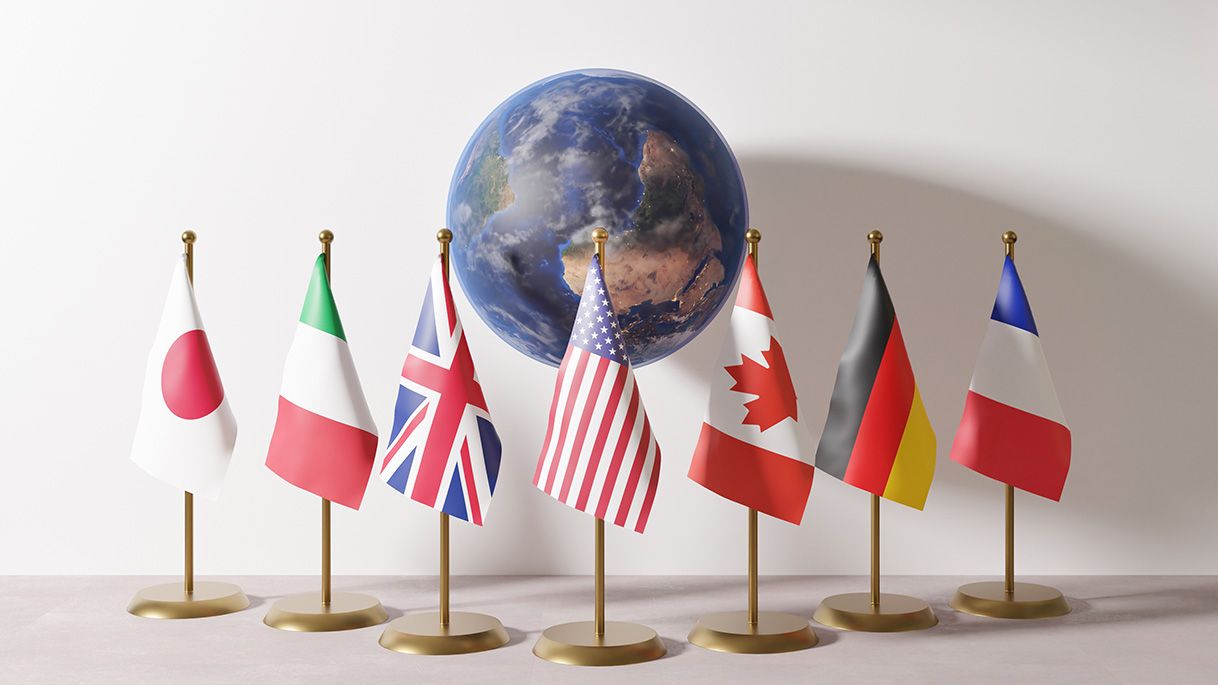Executive Brief

International Relations
G7 SummitChina was a dominant topic of the annual G7 Summit held on 19-21 May in Hiroshima, Japan. The expanded summit with six Indo-Pacific invitees — Australia, the Cook Islands, India, Indonesia, South Korea, and Vietnam — produced a joint communiqué and five standalone statements on Ukraine, nuclear disarmament, economic reliance and security, energy economy, and food security.
Hiroshima concurrently hosted the US-Japan- Australia-India QUAD summit.
Summit participants formulated a joint policy that expressed the desire for continued engagement with China but directly addressed problematic issues: Taiwan; South and East China Seas; human rights in Hong Kong, Xinjiang, and Tibet; and China’s alleged efforts to undermine G7 societies.
Without naming China, other issues were directed at China’s behavior: safeguarding the rules-based international order; fighting economic coercion; enforcing critical technology export control; reducing supply chain reliance; and ensuring critical mineral supplies.
Other topics had implications for China, such as nuclear disarmament, antisatellite testing, fair trade practices, and resolving Third World debt.
G7 joint communiqué“We stand prepared to build constructive and stable relations with China, recognizing the importance of engaging candidly with and expressing our concerns directly to China. We act in our national interest. It is necessary to cooperate with China, given its role in the international community and the size of its economy, on global challenges as well as areas of common interest...Our policy approaches are not designed to harm China, nor do we seek to thwart China’s economic progress and development. A growing China that plays by international rules would be of global interest. We are not decoupling or turning inwards.”
One significant agreement was the G7 Leaders’ Statement on Economic Resilience and Economic Security, which spelled out actions squarely aimed at China:
- Enhancing global economic resilience, to include “building resilient supply chains and building resilient critical infrastructure.”
- Responding to harmful practices that undermine international rules and norms, including (a) Responding to non-market policies and practices to secure global economic resilience; (b) Addressing economic coercion; (c) Countering harmful practices in the digital sphere; and (d) Cooperating on setting international standards. The summit launched a “Coordination Platform on Economic Coercion” to improve collective assessment, preparedness, deterrence, and response to economic coercion, and to further promote partnerships beyond the G7.
- Addressing shared concerns regarding threats to international peace and security — “preventing leakage of critical and emerging technologies.” The summit affirmed the G7’s convergence on coordinating the prevention of cutting-edge technologies from being used for military purposes. The G7 further emphasized “cooperation on export controls on critical and emerging technologies such as microelectronics and cybersurveillance systems to address the misuse of such technologies by malicious actors and inappropriate transfers of such technologies through research activities.”
“China firmly upholds the UN-centered international system, the international order underpinned by international law, and the basic norms governing international relations built around the purposes and principles of the UN Charter.
China will never accept the so-called rules imposed by the few. The international community does not and will not accept the G7-dominated Western rules that seek to divide the world based on ideologies and values, still less will it succumb to the rules of exclusive small blocs designed to serve ‘America-first’ and the vested interests of the few.
G7 needs to reflect on its behavior and change course...gone are the days when a handful of Western countries can just willfully meddle in other countries’ internal affairs and manipulate global affairs.”
China characterized the summit as “the most anti- China G7 summit ever”. China’s Foreign Ministry issued a statement on 20 May:
- “The G7 makes high-sounding claims about ‘promoting a peaceful, stable and prosperous world,’ but what it does is hinder international peace, undermine regional stability, and curb other countries’ development...The G7 used issues concerning China to smear and attack China and brazenly interfere in China’s internal affairs. China strongly deplores and firmly opposes this and has made serious démarches to the summit’s host Japan and other parties concerned.”
- It reiterated China’s positions on Taiwan, Hong Kong, Xinjiang, Tibet, and the South and East China Seas.
- Concerning economic coercion: “The massive unilateral sanctions and acts of decoupling and disrupting industry and supply chains make the US the real coercer that politicizes and weaponizes economic and trade relations. We urge the G7 not to become an accomplice in economic coercion.”
- On the nuclear weapons issue: “China is firmly committed to a defensive nuclear strategy. We have honored our pledge to ‘no first use’ of nuclear weapons and always kept our nuclear capabilities at the minimum level required by national security. China is the only one among the five nuclear weapon states to have made those pledges. China’s position is above board and should not be distorted or denigrated.”